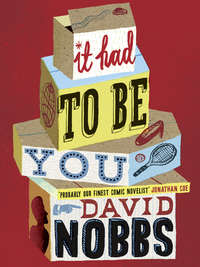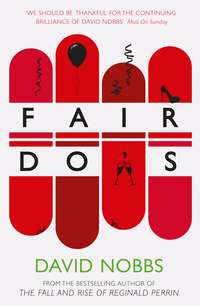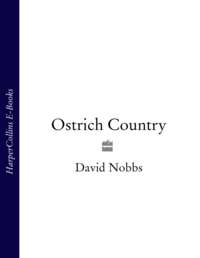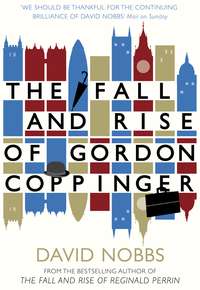
Полная версия
Obstacles to Young Love
He looks up at his father who no longer seems angry.
‘Naomi’s mother met the French teacher in Stead and Simpson’s,’ says his father. ‘A most unfortunate encounter.’
In that moment Timothy realises how naive it was of them to have thought that they could get away with it, and with his recognition of his naivety and of Naomi’s naivety the whole long weekend seems to be stripped of all its joy and beauty and become a tawdry episode involving two very young schoolchildren who thought they were grown up. He hates this. He barely listens to his father. He can guess the details anyway. Naomi had told her parents the French teacher was taking a school trip to Paris. But the French teacher is not in Paris, she is in Stead and Simpson’s in Coningsfield. Naomi’s mother wonders where Naomi can be. The French teacher knows, from her friend Mr Prentice, that Naomi and Timothy are seeing each other. It might be a good idea to phone Mr Pickering. Mr Pickering tells her that his son has gone to France on a school trip.
Roly Pickering bends over, holds out his hand to his son, and pulls him gently to his feet. He kisses the top of his son’s head.
‘I’m sorry I hit you,’ he says. ‘You’re all I have.’
Naomi walks from the station to the bus station, where she catches the number twenty-eight Pouters End bus. She sits upstairs and gazes out over her home town, seeing it and not seeing it, loving it and despising it. So much has happened since she took this journey in the opposite direction just three days ago. At moments she feels too adult to be contained here, to go back to school and hockey and maths and confirmation classes, and then she feels a wave of regret for her disappearing childhood. So many wonderful things happened in London, yet in the end the joy went out of it like a pricked…she is going to think ‘balloon’, but she had been Juliet in Shakespeare and clichés just won’t do. Like a shocked prick. And she feels shocked to be thinking about pricks, and in particular Timothy’s prick, on the twenty-eight bus, in her home town. But the sex had been a revelation, and it was sex born of love, and she just can’t think of any of it as in any way smutty or dirty or degrading. She holds her legs tightly together, as if the beautiful memory of it might slide out from between them. And then an earthquake of loneliness cracks her body and she shudders with the fear of the days without Timothy beside her in bed. She thinks about his lovely sullen darkness, his rough stubble, his occasional devastating shy smile. She loves him. She thinks about praying to God to arrange for her to leave school and live with him and marry him. But God would be too busy and people just didn’t pray on the twenty-eight bus and in any case she isn’t certain…no, she isn’t yet ready to admit to herself that she has doubts about the existence of God. That’s too frightening. That would make home life too difficult.
She is thinking so many things that she almost forgets to get off the bus at Cragley Road. She rings the bell and lugs her case down the stairs in a rush, trips, almost falls, almost tumbles out of the bus into the cool of the autumn evening.
She gazes up the hill towards the big houses of the old textile magnates in Upper Cragley Road, but her path takes her down past the pleasant detached but less impressive houses of Lower Cragley Road. It’s still posh enough to have only names on the houses, though, the numbers being a secret known only to the beleaguered postmen.
L’Ancresse. A pleasant 1930s house with simple lines and a square bay window in the lounge. It had been Laburnum Villa but her parents had renamed it after their favourite bay in Guernsey, where they used to take their seaside holidays. Unlike Timothy, Naomi has always hurried happily to the warmth, safety and sheer good spirits of her family home, but today…today she cannot believe that it is sitting there so calm, so quiet, so sure of itself, as if nothing has changed in the three days since she was last there, and of course, inside the house, now that her elder brothers have fled the nest, nothing will have changed.
And she realises, with a flash of horror, that she has forgotten to make any preparations for the questions that she will be asked about Paris. And hers is a family that asks about everything, shares everything, demands that you share everything.
She stands stock still beside the old English rose bush which is still in glorious flower. Well, it’s too late now. She marches to the front door, gets her key from her handbag, and opens the door, which does not squeak. There is no shortage of everyday essentials in the Walls household, and that includes WD40.
The house is quiet, strangely quiet, but Naomi is too nervous to notice this. Besides, she is not actually always very sensitive to atmosphere. Her teachers at drama school will soon be working on this.
‘Hello!’ she calls out. ‘I’m back. Je suis retournée.’
Her mother and her father emerge slowly from the kitchen and the study respectively. Her mother is smiling. Naomi does not notice that the smile is strained. Her father is not smiling. There is nothing unusual about this. He is not a smiler.
Her mother kisses her, and says, ‘So. How was Paris? Come through and tell us.’
Her father does not kiss her. There is nothing unusual in this. He is not a kisser.
The evening sun is slanting across the kitchen, lighting up the oranges in the Japanese bowl. There’s a smell that Naomi recognises and loves, yet today, for the first time, it seems to smell of the past. It’s a shepherd’s pie, browning in the oven.
She doesn’t know where to begin.
‘It was lovely,’ she says.
‘What did you see?’ asks her father. Naomi is too terrified to notice that he is being a schoolmaster now, not a father.
‘Er…well, the Champs Élysées. Notre Dame.’ She thinks hard, desperately. ‘Les Halles.’
There is silence. She has run out of sights.
‘Not a lot, in three days.’
Her father’s voice is quietly, regretfully merciless. Her mother is moved to try to rescue her daughter, even though she knows that the rescue will itself make matters worse.
‘So, what about the food?’ she asks brightly, but as she pauses her mouth continues to work in that way she has that reveals her inner tension. ‘The French are famous for their food, aren’t they? Where did they take you to eat? Nice bistros?’
Naomi’s heart is beating like the wings of a trapped moth. Her throat is dry.
‘Yes. Exactly. Nice bistros.’
She is afraid that she will blush. She strives so hard not to blush. Her brain is whirring and she even considers the possibility of confessing.
‘One of them was called the Blue Oyster.’
‘What a strange name,’ says her mother.
‘Surely you remember it in French,’ says her father.
‘L’huître bleu.’ The girl’s a fighter.
‘And what did you have? Let’s hear all about it.’
Her mother’s chattiness is terrible for Naomi.
‘Er…not oysters. Miss Malmaison had oysters, and so did two of the girls. Sammy Foster’ll eat anything. I just had steak and chips.’
‘Oh, dear,’ says her mother, falsely bright. ‘I was so hoping to hear details of really local Parisian dishes that I might make.’
Her mother, whose name is Penny – well, it’s Penelope, but nobody ever uses that – is known for good plain cooking. She teaches domestic science and sometimes takes Sunday School at church.
‘I quite thought I might have something new to teach my girls.’
Naomi knows that she has to get away from the question of food. The only food she can think of is the food at the Amalfi, and she hasn’t the wit, in her anxiety, to say that they went to an Italian restaurant. Besides, the food at the Amalfi is a secret between her and her lover.
Inspiration strikes.
‘We went to the Louvre. We saw the Mona Lisa.’
‘Ah,’ says her father. His name is William. He teaches Classics and he’s going bald. There is not necessarily any connection between these two facts. ‘What did you think of her?’
Naomi dredges up something that she has read somewhere.
‘She’s a lot smaller than I expected.’
‘That’s strange,’ says her father. ‘Since you clearly read that somewhere, it’s odd that you should not have expected it.’
‘What?’ She is confused.
‘You haven’t been to Paris, Naomi, so you must have read that.’
His voice is not cruel. His message is devastating, so he would have no need to be cruel, even if he was capable of it. His voice is pained, and that is worse than cruelty to Naomi.
She is free to blush now. All the blushes that she has fought come pouring out. Her cheeks blaze.
‘I met Miss Malmaison in Stead and Simpson’s,’ says her mother quietly.
Naomi is amazed to find that it’s a relief to be found out. She will lie about it no more. In fact, she will never tell another lie in her life, even if she should live to be a hundred. She promises that now in a quick newsflash to God, who does exist after all, it seems.
‘I went to London with Timothy Pickering,’ she says. ‘We had sex together and I love him.’
She bursts into tears. Her mother comes to her and lets her fall into her arms. Her father wishes he was on his boat in the middle of the ocean.
‘We’re engaged,’ sobs Naomi.
She feels as if she is nine, going on thirty-two.
‘I’m so happy,’ she wails.
Her sobs begin to subside.
‘It’s all right,’ she mumbles into her mother’s blouse. ‘We know it’s a sin, and we’ve both apologised to God, but, oh Mum, oh Dad, I’m sorry, but it was so lovely.’
She bursts into tears again. She sobs and sobs. Her nose runs. Her eyes water. Her body shakes.
Her mother, still holding her, looks across at William. Just for a moment there is the old rapport between the two, they both want to laugh but realise that it is not appropriate. Then the shutters come down and her father is paralysed by embarrassment and bewilderment. He can deal with life’s personal crises in the poems of Catullus, but not in the cosy kitchen of L’Ancresse, where the knives and forks and the National Trust mats are on the formica-topped table and the shepherd’s pie will be done to a turn in ten minutes.
In her mother’s eyes there is shock, sadness, love, compassion, fear, pain and – yes, it’s unmistakable even to William – a touch of pride.
Timothy, in goal for Germany against the might of England, at Wembley Stadium, just behind the abattoir, tries to concentrate but can only think of tomorrow. Tomorrow scares him.
Barnes squares the ball to Keegan, who shoots. He scuffs his shot slightly, but Timothy is slow to move and it dribbles just inside his left-hand post. Well, no, there isn’t actually a post. It dribbles just inside the left-hand school blazer.
‘What’s wrong with you today, cabbage-bonce?’ cries Keegan (Tommo). ‘You’re all over the place.’
‘It’s Naomi’s eighteenth tomorrow and I’m scared,’ he admits.
‘Are you really engaged?’
‘Yep.’
It’s Timothy’s ability at sport that has saved him from the mockery that would otherwise be the lot of an awkward, shy only child whose father is a taxidermist and whose mother ran off with a plumber when he was two. Football, cricket, boxing, darts, shove halfpenny, he can do them all. But his engagement is also gaining him a bit of grudging extra respect. The others have all done it with girls, or say they have, but none of them are engaged. They are children. Timothy is a man. He must remember that, and not be scared about tomorrow.
Barnes (Steven Venables) has the ball on the left wing, he tears down the field, he’s a tornado, his trickery and ball control leave three dog turds, an empty bottle of Tizer and a used condom helpless in his wake. He sends in a curling, tempting centre. It hangs in the air. Brooking (Dave Kent) rises gloriously to meet it, remembers how big and heavy the ball is, and hesitates for just a moment. The ball passes within inches of his sweaty forehead. Steven and Tommo shout their derision.
‘Try heading your dad’s oranges,’ yells Tommo. ‘They won’t hurt.’
‘He couldn’t head a tomato,’ cries Steven scornfully. Steven Venables does scorn well.
Dave Kent doesn’t mind their mockery. It washes off him like water off a carrot’s back. Mockery is his lot. Being happy to be mocked is his salvation. Tommo intends to be a gynaecologist because he likes women’s bodies. Steven intends to become a banker because he likes money and is confident enough not to worry about the rhyming slang. Steven oozes confidence. Dave is quite confident too, but only because he knows he’ll never be anything but a greengrocer, and, luckily, he doesn’t want to be anything but a greengrocer.
‘Come on, English swine. You can’t beat me,’ shouts Timothy.
And they can’t. The shots rain in. He dives, sprawls, climbs, hurls himself to left and right, grabs the ball, punches it, tips it round the post (Tommo’s manky blazer). He cannot be beaten.
If he remains unbeaten until they tire of it and go home, everything will go brilliantly tomorrow.
Then Tommo is bearing down on him, getting closer, which way will his shot go? Timothy hesitates for just a second, Tommo twists his heavy but surprisingly lithe body one way, slips the ball the other way. Timothy twists, flings himself towards the ball, touches it but cannot stop it.
‘Goal!’ cries Tommo. He whirls around the waste ground, turns with his arms outstretched towards the fans packed into the great Abattoir Stand in their thousands. ‘King Kev is unstoppable,’ he cries. His suicide is still many years away.
Stupid though he knows it is, Timothy cannot help thinking that failing to save Tommo’s shot is a bad omen for tomorrow.
Sniffy Arkwright is scurrying towards them on his splay feet, which might as well carry a health warning, so unsuitable are they for football. Coningsfield Grammar isn’t nickname territory, by and large, but Sniffy has always been Sniffy and nobody even knows his Christian name. Besides, his voice, hard though he tries to conceal it, reveals with every sentence that he belongs in the world of nicknames and is at Coningsfield Grammar by mistake. He’s sniffing out the possibility of a game, his eagerness to join in setting up waves of instinctive resistance. The fun is over.
‘We’re just going,’ says Timothy.
Sniffy Arkwright isn’t surprised. People are always just going when he approaches. And, since this is what life is like, he doesn’t resent it.
As they walk away, Sniffy following like an exhausted dog, Steven says, ‘It must be awful to be engaged and not be allowed to do it.’
‘Awful,’ echoes Dave, who is much given to echoing.
‘I couldn’t stop myself if I was with Naomi. Christ almighty,’ says Steven.
‘Careful,’ says Tommo. ‘Timothy thinks Christ is almighty.’
They climb the gate at the end of the waste ground, and drop down into the ginnel that runs behind the new industrial estate down to the stinking river. Sniffy still follows, even though he has no idea where they are going or why.
Suddenly Timothy can hold his secret in no longer.
‘We did it when we went to London that time when we were supposed to be in Paris,’ he says. ‘We did it four times in one night and we did other things.’
‘Yes, and I’m the Archbishop of Canterbury,’ says Tommo.
Timothy suddenly longs most desperately for Naomi’s body. He will pray for strength when he gets home. He will pray for strength and patience, and he will ask God to make sure that Naomi likes the very special present that he is giving her for her eighteenth birthday.
Timothy walks slowly down Lower Cragley Road, clutching his brown paper parcel. He is deeply ashamed of its inelegance. Of course a dead curlew is not an easy thing to wrap, the beak has proved a nightmare, but he still feels that he should have done better. The paper is crumpled. Pieces of tape hang from it like plasters left too long unchanged on cuts and warts. He has never been a dab hand at wrapping presents. Paper is never obedient under his fingers. Tape never sticks properly. String simply refuses to be tied. God knows what struggles he will have in his slow mastery of the art of taxidermy. Well, God knows everything, or so Timothy thinks.
‘It’ll just be a quiet little supper party,’ Naomi’s mother Penny has told him. ‘Just us and you and Naomi’s best friend Isobel, and her brothers and their girlfriends. That’s all. She’s having her own party on Saturday.’
Timothy likes Naomi’s mother and he quite likes her father but is utterly tongue-tied in his presence. He has good reason to be wary of Isobel, and the thought of meeting both of Naomi’s brothers and their girlfriends for the first time all at once terrifies him. Oh, please, please, God, if you love me, as you say you do, move the clocks on and let it all have happened already.
God does not respond. Maybe Wednesday is his busy night. Timothy has to force himself to turn right into the garden of L’Ancresse. He has forgotten that yesterday he was a man. He is in psychological short trousers today.
He rings the bell. The door opens and Naomi stands before him in all her assumed purity. She is dressed in white, and has a pink bow in her hair.
He kisses her awkwardly, mumbles, ‘Happy Birthday,’ and thrusts the parcel rather too firmly towards her. She fumbles for it and almost drops it.
‘You squashed my breasts,’ she says.
‘Sorry.’
A bad start. Don’t panic, though.
‘What on earth is it?’ she says, examining it with, it has to be said, an element of disbelief.
‘Open it,’ he says.
He has hopes of getting this bit over in private, but his hopes are dashed.
‘Not yet,’ she says. ‘We’re having presents later.’
He has spent ages getting ready. He has brushed his hair five times. He’s wearing his best suit, which is also his only suit. Luckily, he is unaware that his tie clashes with his shirt. Unfortunately, he has no colour sense, and unfortunately, he has no sense that he has no colour sense.
Naomi leads him into the living room. A log fire is burning brightly. The family stand in front of it like a firing squad. Above them is a painting of a heavily reefed sloop in high seas off Harwich. On the chaise longue in the bay window there is a pile of elegantly shaped presents, all wrapped in attractive gift paper, most of them tied with gossamer knots. Naomi places Timothy’s parcel on top of the pile. It sits there like a deformed weathervane.
‘We’ll have the presents after supper,’ explains Naomi.
Introductions are made. Timothy meets Naomi’s elder brother Julian and his fiancée Teresa. Julian is solid and smiling. Shaking hands with him is like holding a sweaty sea bass. Teresa is tall, cool and beaky. Her handshake is wristy and malevolent. They both look at Timothy as if he is an interruption. He then meets Naomi’s other brother Clive and his girlfriend, who turns out to be a boyfriend, named Antoine. Clive is slight, boyish, wry. He presses Timothy’s hand sympathetically. Antoine is tall and good-looking in a rather stately way. He is wearing a thick bottle-green corduroy suit and is the only man in the room without a tie. His handshake is brisk. Timothy runs his hand down his trousers in an involuntary gesture of shock. He has never shaken hands with a homosexual before.
Timothy also shakes hands very warily with Isobel. No one else in the room, and certainly not Naomi, knows that Isobel once leant across and pinched his prick with savage envy during geography. He has never felt quite the same about glacial moraines since. Or indeed about Isobel. Perhaps it’s the name, he thinks. Isobel is not a suitable name for a child. You’d have to spend the first thirty years of your life waiting to grow into it.
He feels very uneasy. He’s sure that his suit is badly cut. He worries that, even though he has chewed so much gum that his jaw aches, his breath may be tainted by fear. He is certain that he is unshapely, drab, ugly, the human equivalent of his parcel, which will sit on top of the pile on the chaise longue like a stinging rebuke all evening. If only he knew, if only Naomi could tell him, that, while her engagement to a taxidermist’s son who has helped her lose her virginity in a cheap hotel in Earls Court is not the stuff of her parents’ dreams, it is as nothing compared to their first meeting with Antoine this evening. They’d had no idea that Clive’s girlfriend was a boyfriend. They’d not been told that he was French. They’d had not the slightest inkling that he was a struggling artist with no money who sometimes rode a bicycle over pools of paint to achieve his unruly effects. In the Undesirable Partner Stakes, Timothy is an also-ran.
And all the time, the badly wrapped curlew sits there, impossible to ignore.
‘What on earth can it be?’ asks Julian.
‘Something with a spout?’ suggests Teresa.
‘A teapot, perhaps. Though why should Timothy give Naomi a teapot? Unless…’ Clive smiles. ‘Unless they are about to set up home together. Has a date been fixed?’
‘Hardly. They’re very young,’ says Naomi’s father hastily.
Naomi looks across at Timothy and smiles uneasily. Something about her smile worries him, but he soon forgets it because he has a far greater worry. He’s terrified that someone will successfully guess the parcel’s secret.
Luckily, before this can happen, they are called in to supper, which is served in the rather bare dining room. It smells of not being used often enough. The oblong table is simply laid, with the usual National Trust mats and no tablecloth. The meal, too, is simple – melon, roast chicken and trifle. Naomi’s parents do not have sophisticated tastes. But the melon will be juicy, the chicken tasty, the trifle first rate. There is also wine – a rarity at the Walls table. Only white, no red. Timothy refuses to try it. Julian takes a sip, looks at Teresa, then at the label, and nods. Antoine comments, in his almost showily immaculate English, that if he painted blue nuns the bourgeoisie would have kittens. Timothy remembers the nun on the train and catches Naomi’s eye. She smiles. There is a brief moment of complicity across the table. But then she turns to talk to Clive. It is clear that she adores Clive.
Timothy is sitting between Julian and Antoine. He wishes that he was next to Naomi, but he understands that her brothers must have that privilege. He’s relieved that he’s not next to Isobel. The vicious little cow might squeeze his balls in mid-trifle. He sometimes wonders if Naomi is a good judge of character.
Julian turns to him with the air of a man dispensing charity, but his words are bombs that will explode if Timothy understands the subtext.
‘I have to say, and this will probably amaze you, that in the whole of my life I have never met a taxidermist,’ he says, smiling deceptively.
‘Oh. Well, perhaps you could come and meet my dad some time,’ says Timothy.
‘An offer it would be hard to refuse,’ says Julian. ‘Tell me, I’m intrigued, is your house full of stuffed birds and animals or does your father see as much as he can stand of them during his working hours?’
Timothy understands enough to realise that this is one person who will not go into raptures of delight at the unveiling of the curlew.
‘We don’t actually stuff them,’ he says rather stiffly. ‘That’s a popular misconception.’
‘I sit corrected. I apologise for my ignorance,’ says Julian stuffily, and turns away.
Antoine turns to Timothy and asks him if he’s ever been to France.
‘No,’ says Timothy. He knows that his reply is short to the point of being brusque. He tries desperately to think of something to embellish it, but he is hopelessly incapable of dealing with Antoine. ‘Never,’ he says.
‘Do you like art?’ asks Antoine.
‘Oh, yes. My dad says what we do is a kind of art.’
‘Are there any particular artists that you admire?’
‘I like Peter Scott,’ offers Timothy after some thought.
‘I do not know this Peter Scott,’ says Antoine.







